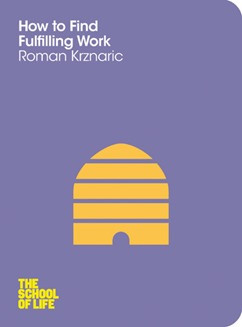How to Find Fulfilling Work

The author tries to answer two questions via this book :
-
What are the core elements of a fulfilling work ?
-
How should we make a change to our current path so that our work is in line with our being.
Give meaning to work
The author talks about five aspects relevant to work :
-
earning money
-
achieving status
-
making a difference
-
following our passions
-
using our talents
The author categorically states the earning money and achieving status might not give meaning to our work. Most often than not, one gets on to a “hedonistic” treadmill that is difficult to get off. Instead pursuing “making a difference” path is a better option. It might lead an individual to try out a variety of jobs, learn a variety of skills, and become a portfolio worker. It is one of the ways to explore “many selves” that lie within us. The chapter also explores the various challenges that one might have to face in following any of the above paths. Personally I find “using your talents” path to be quite appealing. I have taken a path of “developing talents and then doing your bit in making your talents useful to others”. If you forget the monetary aspect and status aspect of any work and immerse yourself in developing talents, I guess one might find that learning a specific skill and putting it to use, could be a wonderful experience. There are obvious challenges that one must encounter on day to day basis. However I guess the “love” element towards your work will give all the strength to face the challenges. The author’s message from this chapter is that there are three core elements of a fulfilling work, i.e. meaning, flow and freedom. Each of these elements are concisely discussed via examples and anecdotes. Light reading but there is no fluff here.
If you are going to get good at something you need a tunnel vision.
_– Wayne Davies
_
Act First, Reflect Later
One often hears stories of somebody abandoning a certain career and heading out to do something radical. These stories are inspiring but they need a lot of courage. Not many would be in a state of mind to take such extreme step. Instead the author suggests three alternate ways
-
radical sabbatical
-
branching projects : start doing things in the context of your project on weekends or mini-breaks
-
conversational research : talk to people who might be working in the field that you want to work, get to know some details of the work etc.
The above three suggestions involve doing first and then reflecting later. While working on alternatives, one must seek out “flow” experiences. These tend to be activities in which we lose the sense of time. However one must always remember that there might be some activities where the struggle itself could be something that we find rewarding. Imagine understanding a certain branch of math. To get to “flow” state will take a LOT of time. However the struggles that you take up on a day to day basis and the incremental understanding of the subject could provide the kick needed to be continue working. To get more clarity about “flow” experiences, it is better to keep a monthly log of such experiences and reflect on them from time to time.
The Longing for Freedom
Based on many interviews with independent consultants, the author says that “bespoke consultant job” is both wonderful and awful. However once experiencing the freedom of a freelancer, most of them say that they would never trade-in with a 9-to-5 job. On the contrary, one can explore even in a routine job. There is a story about Wallace Stevens which goes like this:
By day he worked in an insurance company, eventually becoming vice-president of an established firm in Connecticut. But he was no workaholic: he returned home each evening to write verse, and was considered one of the great modernist poets of the early twentieth century. Stevens kept these two lives separate: he always felt something of an imposter in his day job; it was “like playing a part”, he wrote. He regarded poetry as his “real work”- even if he wasn’t paid for it- and never wanted to commercialize his art by becoming a “professional” poet. After winning the Pulitzer Prize in 1955 he was offered a faculty position at Harvard that would have allowed him to write poetry for a living, but he turned it down to stay in his insurance job.
**
How to grow a vocation**
The book ends with a saying that there is no right vocation that one can “find”. One has to “grow” in to it. Once you start cultivating your talents, you see that those talents will give you the freedom to do certain things, and by taking those actions, you grow in to a vocation. This opinion is similar to the one offered by Cal Newport in his book,“So good that they can’t ignore you”. The story of Marie curie illustrate the point that there is no magical calling that will become apparent to you one fine day. Real vocation is one where you grow in to it, rather than finding one.
The book is very compact and can be read in a few hours. What I like about the book is the various stories that the author manages to put in, so that the main takeaways of the book are implicit and do not sound preachy.